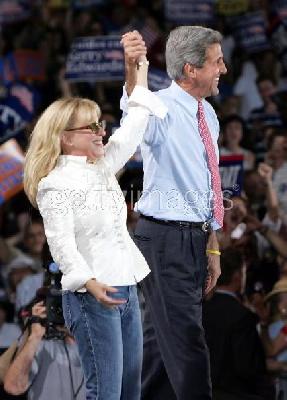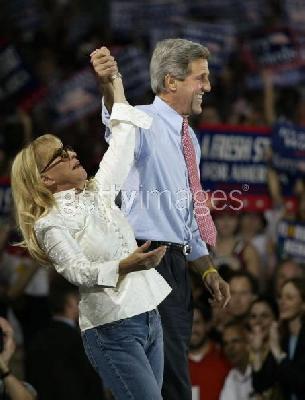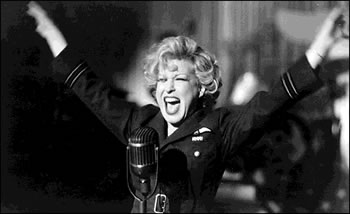THE RACE FOR THE WHITE HOUSE
Kerry: Candidates Use Their Muscle, Hone Messages in Final Days
Challenger shifts his tone to put a positive face on the closing days of the campaign. Bruce Springsteen and Bette Midler stump in Miami.
By Matea Gold
LA Times Staff Writer
October 30, 2004
Photo: Getty Images (Thanks Wendy For Sending Them)
MIAMI — After assailing President Bush all week for a missing cache of explosives in Iraq, Sen. John F. Kerry turned to broader themes Friday, distilling the race down to a choice between a misguided, ineffective incumbent and a challenger who offers a brighter future.
As he sprinted across Florida — with stops including a waterfront rally under balmy skies in West Palm Beach and a festive nighttime assembly of thousands in Miami with singers Bette Midler and Bruce Springsteen — the Democratic candidate infused his calls for people to vote with promises that life would improve under his watch.
“When you go into that voting booth, you’re going to face a fundamental choice: Do we want four more years of the same failed course?” Kerry asked 500 supporters gathered in an Orlando exhibition center. “Or do you want a fresh start for America?” he added, drawing whoops, whistles and a sustained standing ovation.
The Massachusetts senator’s effort to highlight his case for change, however, was interrupted Friday afternoon with the broadcast of a tape in which Osama bin Laden took responsibility for the Sept. 11 attacks.
In response, Kerry made a brief statement stressing his determination “to hunt down, capture or kill the terrorists.” Advisors said they would not let Bin Laden’s reemergence derail the campaign’s message.
“It’s very important for us to move forward,” senior advisor Mike McCurry told reporters aboard Kerry’s plane. “We’re in the closing days of the campaign. We’re going ahead and doing our events as we would.”
Earlier in the day, Kerry urged the country to “wake up” and realize that the middle class had suffered under the Bush administration.
“By now, it is clear that no matter who tells him, no matter how many times he hears it, and no matter how bad things get, George W. Bush just doesn’t understand the problems that are facing America and the average Americans of our country,” he said in Orlando.
Bush campaign aides suggested that Kerry’s language indicated that he was losing ground.
But Kerry’s advisors maintained that the Democrat was ahead in crucial battleground states, including Florida.
The memory of Florida’s bitterly disputed recount four years ago loomed prominently for Kerry at each stop, as audiences thundered repeatedly: “Four more days!”
In West Palm Beach, Mayor Lois J. Frankel told hundreds of people assembled in an amphitheater that “the butterfly ballot changed the world,” referring to a confusing ballot design that led many residents to cast votes for the wrong candidate.
“We’ve been waiting four years to get back to the polls,” she said. “Palm Beach County, are you finally ready to have your votes counted?” The crowd answered with a roar.
Kerry’s focus was decidedly different than during the last four days, when he pounded Bush for the disappearance of tons of explosives from a facility near Baghdad as a symbol of his mismanagement of Iraq.
On Friday, the Democrat did not mention the missing munitions, despite a new report suggesting that at least some of weapons were still there after the U.S. invasion. Similarly, he did not press his longstanding criticism of no-bid military contracts that went to Halliburton Co., despite emerging details about an FBI investigation into whether a large Army contract with the company violated procurement rules. His running mate, Sen. John Edwards of North Carolina, did.
Aides said they believed Kerry had made his case convincingly on those subjects and wanted to end what has been a bitterly fought campaign with a more sweeping, uplifting message. And they tacitly acknowledged that fueling harsh exchanges with Bush would only muddy Kerry’s attempt to end the race on a positive tone.
“Putting anything else out there creates some other story,” McCurry said.
Instead, the candidate, who has a tendency to rattle off dry statistics at his audiences, attempted to put a personal face on his message by talking about the Americans who would be going to the polls Tuesday.
Kerry wasn’t referring to specific individuals but composites of people who represented voters and their concerns. He described a father who had lost his job to outsourcing and was worried about paying for his children’s health insurance.
“He’ll wonder whether or not he can afford four more years of a president who fights for those at the top while telling everyone else that this is the best economy of our lifetime,” Kerry said in Orlando.
He described the husbands and wives of U.S. soldiers serving in Iraq who were anxious about when they would see their spouses again.
“They’ll wonder whether or not they can afford four more years of a president who’s unwilling to admit the mistakes that he has made, and says he would do everything all over again the same way,” the candidate said.
Kerry also tried to show a personal side, punctuating events with references to his Vietnam service and religious faith.
Standing before a massive American flag on stage in West Palm Beach, he urged supporters to apply their “values” and “religious teachings” to their selection of a president.
Kerry suggested that for all of Bush’s talk about faith, the Republicans “just cross by to the other side of the street and take care of themselves.”
Aides had billed the speech in Orlando as “the Cliff Notes version” of a series of “closing arguments” Kerry delivered over the last week and a half.
Indeed, the candidate offered a boiled-down summary of his case against Bush, ticking off his stances on Iraq, the minimum wage, stem cell research, college tuition, Medicare, prescription drugs and a host of other issues.
The senator said American troops were at greater risk in Iraq because of Bush’s handling of the war and middle-class families were struggling to get by because of the president’s indifference to their lives.
“That may be George Bush’s record,” he said. “But it doesn’t have to be America’s future. And if we do our work, it won’t be.”
For all the talk of a positive tone from the Democratic campaign, Kerry was lobbing some political grenades onto the television airwaves in the closing days.
He launched one 30-second TV ad in Portland, Maine, that accused Bush of seeking to privatize Social Security and putting retiree benefits at risk.
“They were hoping to keep it a secret,” Kerry’s ad said, showing pictures of elderly people. Bush has strenuously denied that he would allow a cut in benefits, although he has proposed shifting to an option of private accounts for younger workers. Critics say the president’s plan has not accounted for at least $1 trillion in transition costs.
Edwards used the FBI investigation into Halliburton Co., where Vice President Dick Cheney previously worked as chief executive, to question the Bush administration’s ethics.
Halliburton has been awash in controversy for receiving no-bid government contracts for the rebuilding of Iraq.
“Nothing speaks louder about their values and what they stand for than Halliburton,” Edwards told more than 1,000 supporters at a rally in Muskegon, Mich.
Edwards said the company was also being investigated for having bribed foreign officials during Cheney’s tenure, paid more than $7 million in fines for releasing false information and did business while the vice president was in charge with Libya and Iran, “two sworn enemies of the United States of America.”
“There is one thing you can be sure of: Halliburton’s free ride will continue if George Bush and Dick Cheney get four more years,” Edwards said as the crowd cheered. “But if John Kerry is elected, it will stop, and it will stop immediately.”
Edwards and his wife, Elizabeth, cast their ballots at Pullen Arts Center in Raleigh, N.C. at about 6:30 Friday night. The process took about 10 minutes; the candidate ignored shouted entreaties to comment on the Bin Laden tape. He headed off to a rally, then flew to Ohio to spend the night.
——————————————————————————–
Times staff writers Nick Anderson in Washington, Michael Finnegan in Miami, and Maria L. La Ganga in Raleigh, N.C., contributed to this report.








